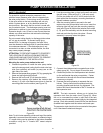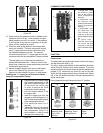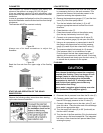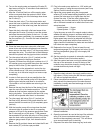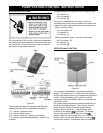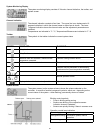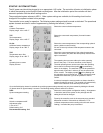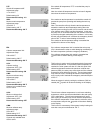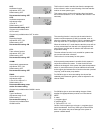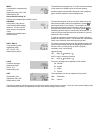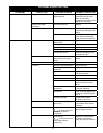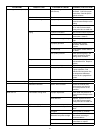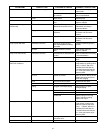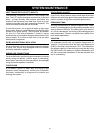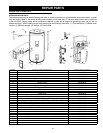
34
SYSTEM MAINTENANCE
HEAT TRANSFER FLUID (HTF) QUALITY
The chemical composition of the HTF may change over
time. The HTF quality should be monitored on a periodic
basis – at least annually. After summer and before any
chance of the first freeze is an ideal time. A drop in ph can
indicate the system has been stagnating frequently. The
cause should be determined and corrected.
To test the pH level, use a digital ph tester or tight range
litmus paper. Remove a small sample of the fluid from the
airstop on the pump station. The pH should be between
8.1 and 12.0. Fluid with pH between 7.5 and 8.1 can be
conditioned by your contractor using an inhibitor boost. Fluid
with pH above 12.0 or that is dark, dirty or has an acidic
smell should be replaced.
PIPING AND EXTERNAL INSULATION
On an annual basis, all piping should be checked for leakage
at joints, and unions. Any damaged external insulation
should be repaired or replaced.
WIRING AND CONNECTIONS
On an annual basis, check wiring and connections, including
sensor wiring and splices. Look for signs of overheating,
discoloration, corrosion or loose connections. Any damaged
wiring should be repaired or replaced.
FLUID LEAKS
If you detect a glycol or water leak, or the glycol loop
pressure drops unexpectedly, contact your installation
contractor immediately to diagnose the problem and
recharge the system.
SOLAR PANEL CLARITY
If you live in a dusty climate, once a month wash off dirt that
settles on the solar panel glass. Clean glass allows the solar
panel to maintain a high level of thermal performance.
EXPANSION TANK
Annually check condition of the solar expansion tank. Check
to see if it is waterlogged by quickly pressing schrader valve
stem at bottom of the tank. You should get a quick burst of
air. If fluid is discharged, the tank may be waterlogged and
need replacement. Contact a qualified solar installer if the
tank needs replacement.
VACATION
For extended periods with no hotwater usage such as
vacation it is recommend that the max. tank temperature
(S MX) in the solar control be set to 120°F. This maximizes
the storage capaicity of heat build-up during the day using
the CMX function for maximum collector temperature and
will aid in preventing breakdown of the heat transfer fluid
due to overheating.



